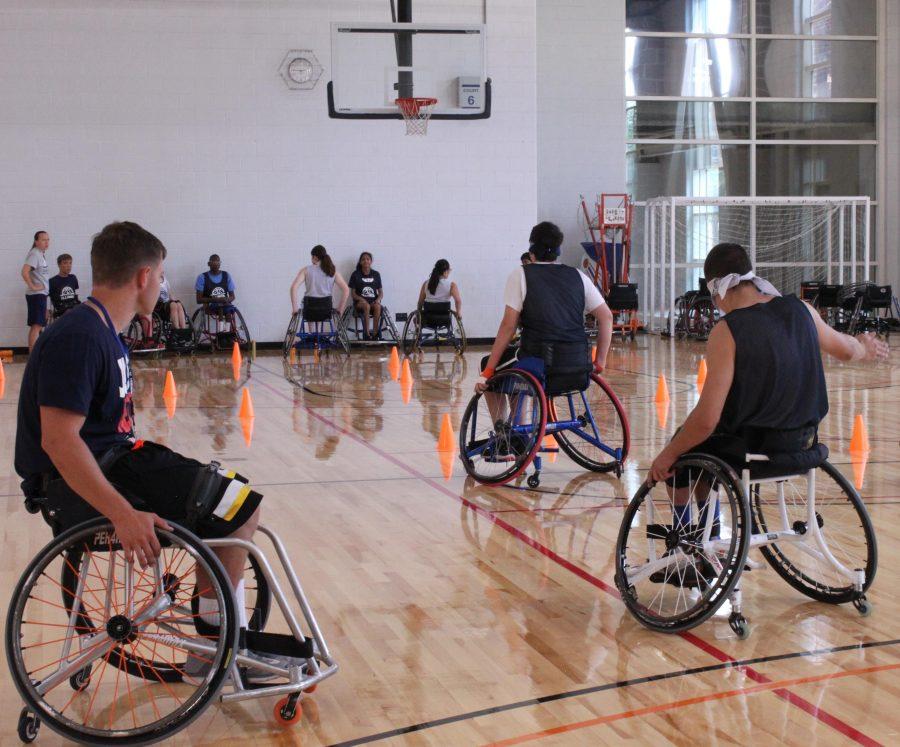Kids score valuable life lessons at basketball camp
Aug 21, 2016
Sixty wheelchairs scrambled around the six-court gym of the University of Illinois’ Activities and Recreation Center like a bunch of wild animals.
They zoomed to one corner where they sat and waited. Then, seconds later, they whizzed back to the other side.
This was a game of “blog tag,” which is similar to regular tag except the person who’s “it” must tag and latch onto another individual to form a train that can reach from three to five chairs in length.
This game was just one of many that around 60 kids with disabilities participated in during the 2016 Illinois basketball camp at the ARC from July 5-9. The annual camp is hosted by the Illinois men’s and women’s wheelchair basketball teams, and kids from all over the nation come to participate.
While most of the kids were from Midwestern states, some had much longer rides from places like California, Maryland and Virginia. One coach even flew in from Brazil.
Get The Daily Illini in your inbox!
The kids had disabilities ranging from amputations and cerebral palsy to spinal cord injuries and transverse myelitis, a rare neurological inflammation of the spinal cord.
They all came together to learn the fundamentals of wheelchair basketball, including shooting, ball handling, defense, passing, communication and chair movement.
“It’s pretty personal because I myself started playing basketball for two years (before college),” junior Katy Borum said. “I feel like if I could have gotten into it when I was younger, I could have related to more kids with disabilities. I could have made a lot more personal connections.”
In the morning hours, the campers parked their colorful, polka dotted, striped and shiny manual wheelchairs and prosthetics along the edges of the six-court gym and strapped themselves into their basketball chairs. The kids were split into six different groups with campers who had similar skillsets.
Those groups remained together throughout the day and alternated between the six different stations at each of the courts in the gym.
At one court, current Illini Ryan Neiswender and 2004 Illinois grad Chris Rathje taught the kids about chair movement. The two sat at the free-throw line with the campers lined up along the baseline under the basket, listening intently.
Neiswender and Rathje told the group about how to maneuver in a certain way. Then, with Rathje up top, Neiswender nearly locked tires with him and performed a swift spin move around Rathje to illustrate effective spins. The campers broke into twos and tried to imitate their teachers for the next few minutes.
“I’ve been around,” Rathje, who currently lives in the Chicago suburbs, said. “I’ve seen a lot of things. I can say things in kind of an interesting way that maybe they’ve never heard before.”
At another court, Kate Rougeau stood under the basket beside a group of focused kids. Rougeau, an assistant for Illinois’ wheelchair basketball teams, helped this group direct a blindfolded member around a series of cones.
On the other side of the gym, Jorge Alfaro yelled ‘Give ‘em some booty’ to his campers. He was instructing the athletes how to use momentum in their bottoms to turn better.
Alfaro played for the Rehabilitation Institute of Chicago last year and also coaches a division III wheelchair basketball team in the area.
“Just when I thought I knew enough, I’ve been humbled …” Alfaro, who’s been in the league for 30 years, said. “I’m always looking for a new angle, and the new angle I discovered is the psychological advantage or focus.”
In the afternoon, the kids regrouped and played five-on-five exhibition games against each other, naming themselves after each of the universities in the Big Ten.
In one play, a Michigan State guard raced up the court, grabbed his tires and came to a screeching halt at the left wing.
He looked inside to make a pass. The defense was surrounding the paint, leaving no opening, but the guard lobbed the ball over the scrambling defense and to an open right guard for the three.
The team’s bench erupted in cheers. The kids’ parents smiled and clapped. And so did the referees.
“I think it’s phenomenal,” said Stephanie Wheeler, coach of the Illinois women’s wheelchair basketball team. “I think it’s really important that they see that whatever limitations someone has put on them because they have a disability, that they’re sort of breaking that glass ceiling and they’re like, ‘No I play wheelchair basketball.’”
@32Ryno






